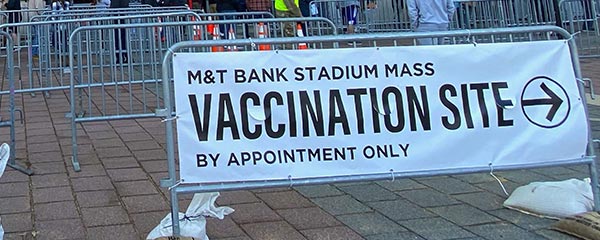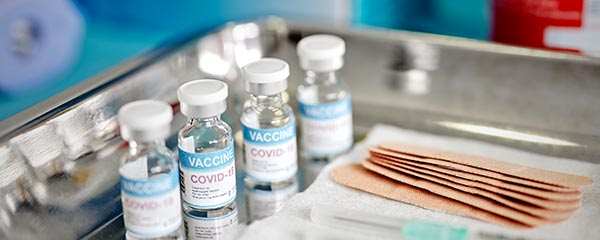Story Highlights
- Record-high 76% are satisfied with vaccine rollout in U.S.
- 55% are worried about others choosing not to get vaccinated
- 15% are worried about vaccine supply
WASHINGTON, D.C. -- With more than half of U.S. adults now at least partially vaccinated against COVID-19, a record-high 76% are satisfied with the vaccine rollout in the U.S. Americans' satisfaction with the vaccination process is up from 68% in March and has more than doubled since the 34% recorded in late January.

Line graph. Americans' satisfaction with the COVID-19 vaccination process in the U.S. since January. Currently, 76% are either very satisfied or satisfied, up from 34% in January, 44% in February and 68% in March.
Democrats' satisfaction has roughly quadrupled to 87% since late January, when 22% were satisfied and President Joe Biden was newly in office. At the same time, Republicans' and independents' satisfaction has also grown, though at a slower rate than Democrats'. Currently, 68% of Republicans and 70% of independents are satisfied.
These findings are from Gallup's ongoing COVID-19 probability-based web panel survey, which was conducted April 19-25, just as all U.S. adults became eligible to receive a coronavirus vaccine. The temporary pause of the Johnson & Johnson vaccine by the Centers for Disease Control and Prevention as well as the U.S. Food and Drug Administration (FDA) because of safety concerns took effect a week before the survey began and was lifted on April 23, before it ended.
More Worry About Those Unwilling to Be Vaccinated Than a Lack of Vaccines
After peaking in the first half of April, vaccinations in the U.S. have slowed. Gallup's latest polling about the pandemic finds Americans are over three times more worried about people in their local area choosing not to be vaccinated against COVID-19 (55%) than about the availability of vaccines (15%).
Those worried about others not being vaccinated are about equally split between saying they are very worried (28%) and moderately worried (27%).
| Very | Moderately | Not too | Not at all | ||||||||||||||||||||||||||||||||||||||||||||||||||||||||||||||||||||||||||||||||||||||||||||||||
|---|---|---|---|---|---|---|---|---|---|---|---|---|---|---|---|---|---|---|---|---|---|---|---|---|---|---|---|---|---|---|---|---|---|---|---|---|---|---|---|---|---|---|---|---|---|---|---|---|---|---|---|---|---|---|---|---|---|---|---|---|---|---|---|---|---|---|---|---|---|---|---|---|---|---|---|---|---|---|---|---|---|---|---|---|---|---|---|---|---|---|---|---|---|---|---|---|---|---|---|
| % | % | % | % | ||||||||||||||||||||||||||||||||||||||||||||||||||||||||||||||||||||||||||||||||||||||||||||||||
| People choosing not to get the COVID-19 vaccine | 28 | 27 | 16 | 30 | |||||||||||||||||||||||||||||||||||||||||||||||||||||||||||||||||||||||||||||||||||||||||||||||
| Availability of COVID-19 vaccine supply | 2 | 13 | 39 | 46 | |||||||||||||||||||||||||||||||||||||||||||||||||||||||||||||||||||||||||||||||||||||||||||||||
| GALLUP PANEL. April 19-25, 2021 | |||||||||||||||||||||||||||||||||||||||||||||||||||||||||||||||||||||||||||||||||||||||||||||||||||
U.S. adults in some demographic groups are particularly worried about others in their local area not being vaccinated. Roughly four in five among Democrats (82%) and those who say they are worried about contracting COVID-19 (78%) say they are worried about the lacking vaccinations, while far fewer express the same level of concern among Republicans (23%) and those who are not worried about getting the disease (45%).
Americans' Willingness to Receive COVID-19 Vaccination Steady
Although the national vaccination pace is slowing down, willingness to be immunized against the coronavirus is steady, with 75% of U.S. adults saying they are already vaccinated or plan to be, similar to 74% in March.

Line graph. Americans' willingness since July 2020 to receive a COVID-19 vaccine that has been approved by the FDA. Currently, 75% say they are willing to receive one (or have already received at least one dose), and 25% say they are not willing. This is on par with March's 74% reading but well above the lowest reading of 50%, recorded in September.
Even though the overall rate of vaccine willingness has been steady, the percentage who report that they have already received at least one shot has risen sharply from 32% in March to 57% in April, while the proportion yet to be vaccinated -- those who say they are willing -- has fallen to 18%. Meanwhile, the percentage unwilling, at 25%, is by one point the lowest Gallup has measured to date.
Republicans remain the least likely of all demographic subgroups to be vaccinated or say they are willing to be.
Women, those aged 65 and older, Democrats, college graduates and those with annual household incomes of at least $90,000 are more likely than their counterparts to say they have been vaccinated.
| Have already received vaccine |
Combined: Willing to receive/Already received |
|||||||||||||||||||||||||||||||||||||||||||||||||||||||||||||||||||||||||||||||||||||||||||||||||||
|---|---|---|---|---|---|---|---|---|---|---|---|---|---|---|---|---|---|---|---|---|---|---|---|---|---|---|---|---|---|---|---|---|---|---|---|---|---|---|---|---|---|---|---|---|---|---|---|---|---|---|---|---|---|---|---|---|---|---|---|---|---|---|---|---|---|---|---|---|---|---|---|---|---|---|---|---|---|---|---|---|---|---|---|---|---|---|---|---|---|---|---|---|---|---|---|---|---|---|---|---|
| % | % | |||||||||||||||||||||||||||||||||||||||||||||||||||||||||||||||||||||||||||||||||||||||||||||||||||
| U.S. adults | 57 | 75 | ||||||||||||||||||||||||||||||||||||||||||||||||||||||||||||||||||||||||||||||||||||||||||||||||||
| Gender | ||||||||||||||||||||||||||||||||||||||||||||||||||||||||||||||||||||||||||||||||||||||||||||||||||||
| Men | 53 | 74 | ||||||||||||||||||||||||||||||||||||||||||||||||||||||||||||||||||||||||||||||||||||||||||||||||||
| Women | 61 | 77 | ||||||||||||||||||||||||||||||||||||||||||||||||||||||||||||||||||||||||||||||||||||||||||||||||||
| Age | ||||||||||||||||||||||||||||||||||||||||||||||||||||||||||||||||||||||||||||||||||||||||||||||||||||
| 18-44 | 54 | 75 | ||||||||||||||||||||||||||||||||||||||||||||||||||||||||||||||||||||||||||||||||||||||||||||||||||
| 45-64 | 53 | 71 | ||||||||||||||||||||||||||||||||||||||||||||||||||||||||||||||||||||||||||||||||||||||||||||||||||
| 65+ | 72 | 84 | ||||||||||||||||||||||||||||||||||||||||||||||||||||||||||||||||||||||||||||||||||||||||||||||||||
| Party identification | ||||||||||||||||||||||||||||||||||||||||||||||||||||||||||||||||||||||||||||||||||||||||||||||||||||
| Republicans | 39 | 53 | ||||||||||||||||||||||||||||||||||||||||||||||||||||||||||||||||||||||||||||||||||||||||||||||||||
| Independents | 52 | 69 | ||||||||||||||||||||||||||||||||||||||||||||||||||||||||||||||||||||||||||||||||||||||||||||||||||
| Democrats | 74 | 95 | ||||||||||||||||||||||||||||||||||||||||||||||||||||||||||||||||||||||||||||||||||||||||||||||||||
| Education | ||||||||||||||||||||||||||||||||||||||||||||||||||||||||||||||||||||||||||||||||||||||||||||||||||||
| Not college graduate | 52 | 70 | ||||||||||||||||||||||||||||||||||||||||||||||||||||||||||||||||||||||||||||||||||||||||||||||||||
| College graduate | 69 | 87 | ||||||||||||||||||||||||||||||||||||||||||||||||||||||||||||||||||||||||||||||||||||||||||||||||||
| Annual household income | ||||||||||||||||||||||||||||||||||||||||||||||||||||||||||||||||||||||||||||||||||||||||||||||||||||
| Less than $36,000 | 53 | 75 | ||||||||||||||||||||||||||||||||||||||||||||||||||||||||||||||||||||||||||||||||||||||||||||||||||
| $36,000-<$90,000 | 54 | 71 | ||||||||||||||||||||||||||||||||||||||||||||||||||||||||||||||||||||||||||||||||||||||||||||||||||
| $90,000+ | 64 | 80 | ||||||||||||||||||||||||||||||||||||||||||||||||||||||||||||||||||||||||||||||||||||||||||||||||||
| gallup panel, April 19-25, 2021 | ||||||||||||||||||||||||||||||||||||||||||||||||||||||||||||||||||||||||||||||||||||||||||||||||||||
Reasons for COVID-19 Vaccination Hesitancy Unchanged
The April pause in the administration of the Johnson & Johnson vaccine seems to have done little to affect Americans' reluctance to receive the vaccine, both in terms of the percentage unwilling to get vaccinated and the reasons they give for doing so, neither of which have changed since March.
The main reason those who plan not to be vaccinated give for their reluctance is a preference to wait and confirm it is safe (24%) or doubting that the health effects from the disease would be serious if they contracted it (21%). Another 17% are concerned about the speed with which the vaccine was developed, and 16% do not trust vaccines in general. Fewer attributed their unwillingness to other causes.
| Those who would not be vaccinated |
|||||||||||||||||||||||||||||||||||||||||||||||||||||||||||||||||||||||||||||||||||||||||||||||||||
|---|---|---|---|---|---|---|---|---|---|---|---|---|---|---|---|---|---|---|---|---|---|---|---|---|---|---|---|---|---|---|---|---|---|---|---|---|---|---|---|---|---|---|---|---|---|---|---|---|---|---|---|---|---|---|---|---|---|---|---|---|---|---|---|---|---|---|---|---|---|---|---|---|---|---|---|---|---|---|---|---|---|---|---|---|---|---|---|---|---|---|---|---|---|---|---|---|---|---|---|
| % | |||||||||||||||||||||||||||||||||||||||||||||||||||||||||||||||||||||||||||||||||||||||||||||||||||
| Want to wait to confirm it is safe | 24 | ||||||||||||||||||||||||||||||||||||||||||||||||||||||||||||||||||||||||||||||||||||||||||||||||||
| Don't think health effects of COVID-19 would be serious | 21 | ||||||||||||||||||||||||||||||||||||||||||||||||||||||||||||||||||||||||||||||||||||||||||||||||||
| Concerned about timeline for developing it | 17 | ||||||||||||||||||||||||||||||||||||||||||||||||||||||||||||||||||||||||||||||||||||||||||||||||||
| Don't trust vaccines generally | 16 | ||||||||||||||||||||||||||||||||||||||||||||||||||||||||||||||||||||||||||||||||||||||||||||||||||
| Had the coronavirus/Have antibodies | 10 | ||||||||||||||||||||||||||||||||||||||||||||||||||||||||||||||||||||||||||||||||||||||||||||||||||
| Concerned about allergic reaction to the vaccine | 10 | ||||||||||||||||||||||||||||||||||||||||||||||||||||||||||||||||||||||||||||||||||||||||||||||||||
| Want to wait to see how effective it is | 4 | ||||||||||||||||||||||||||||||||||||||||||||||||||||||||||||||||||||||||||||||||||||||||||||||||||
| gallup panel, april 19-25, 2021 | |||||||||||||||||||||||||||||||||||||||||||||||||||||||||||||||||||||||||||||||||||||||||||||||||||
Bottom Line
Scientists and medical experts are now saying that herd immunity, once thought to be the nation's salvation, is unlikely to occur in the U.S. -- at least partly because of the sizable number of Americans unwilling to be vaccinated and because a vaccine is not yet available for younger children. Now that the nation's COVID-19 vaccine supply has caught up to the public's demand in many places in the U.S., the Biden administration and state governments are deploying efforts to reduce vaccine hesitancy.
While there was concern that the Johnson & Johnson vaccine pause might result in increased reluctance, Gallup's polling has not shown any change in the public's willingness to be vaccinated.
Learn more about how the Gallup Panel works.




